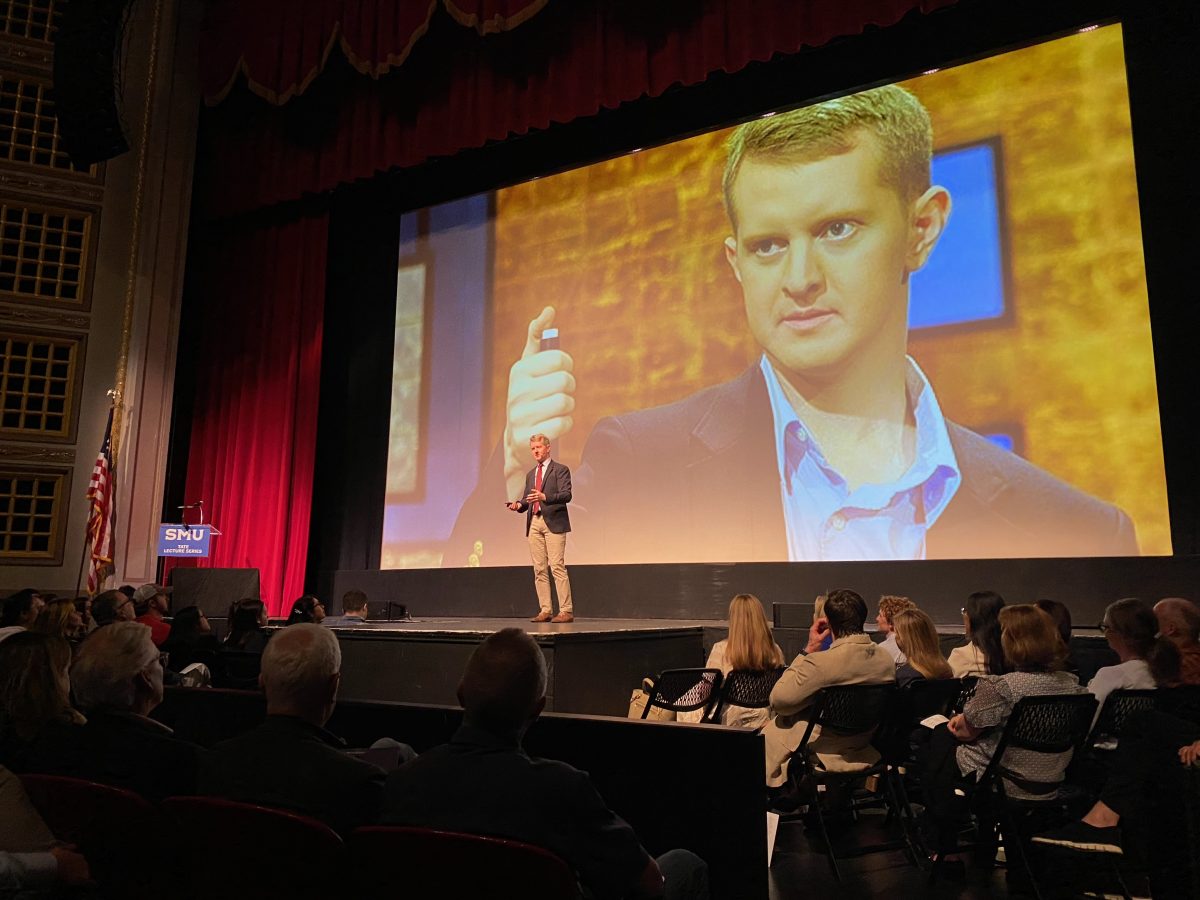SMU’s latest Tate Lecture series featured Ken Jennings, the record holder for consecutive wins on Jeopardy!, on March 5. Jennings won 74 consecutive games of Jeopardy! between June 2 and November 30, 2004, earning a total of $2,522,700. He currently hosts the show following the death of former host Alex Trebek in 2020.
Jennings spent most of his adolescence in Asia, as his family moved to South Korea when he was seven years old for 11 years. He described living in Asia as a wonderful experience, yet he still felt starved for American pop culture as a child. To satiate this craving, Jennings leaned heavily on the single TV channel in English he had access to while abroad, Armed Forces Network. The channel aired Jeopardy! daily.
Jennings’ lecture covered the recent advent of Artificial Intelligence and his experience battling against it during Jeopardy!’s IBM Challenge when he competed against the Watson supercomputer. Jennings suffered a staggering loss of $77,147 to $24,000 to the question-answering machine that combined Artificial Intelligence and automated sophisticated analytics. For Jennings, competing with the Watson supercomputer was the opportunity of a lifetime, and he was thrilled to be on the frontlines of such cutting-edge technological advancements and to represent the human race on this new frontier of innovation.
“I wanted to be right there at ground zero,” Jennings said. “I was absolutely confident I was going to win”.
Jennings described that despite computers’ ability to retrieve information from their bank of data without fail, human contestants still have an advantage over potential AI opponents. Though humans may have occasional memory lapses when it comes to finding answers, the language used in the game’s clues is more easily understood by humans and harder to decipher by a computer.
Unfortunately, the human ability to press the Jeopardy! buzzer first was no match for Watson’s circuitry-based reflexes. Even though Jennings joked that he experienced advancements in technology encroach on what he believed made him special, he still encouraged the audience to stay inquisitive.
Curiosity is the fuel that powers the engine that is our mind, Jennings perpetuated in his lecture. Genuine interest in a topic, as Jennings suggests, can help one recover related tidbits from memory with ease. It’s a similar phenomenon to the same way, it’s not difficult to recite your favorite lines from a movie, sing along to a song you enjoy, or name the players on your favorite team.
Though modern technology conveniently allows for an entire wealth of knowledge made available to anyone through their smartphone, there is a definable difference between access to this information and true knowledge. Jennings suggests that there is a level of human intimacy behind sharing an understanding the tidbits of knowledge we each find fascinating. Moreover, genuine connections between people are made when they have a mutual area of interest. This link is less likely to be established with a quick Google search for the “right” answer. Sharing an instant connection is a way for people to bond and cannot be replicated using a search engine.
Jennings concedes that there is much more to know today than there was before the introduction of Artificial Intelligence and the internet, but the way to stay on top of the expanding world of knowledge we are in is to grow our basic understanding rather than become reliant on new tools to stay afloat.
The Jeopardy! star shared this about contestants he has met on the show: they are consistently very passionate people. The contestants’ vast knowledge does not come from sharing a sponge archetype but rather stems from being deeply passionate about their area of expertise. This distinction, Jennings shared, is precious because the contestants treat learning and exchanging information with each other as a labor of love.









